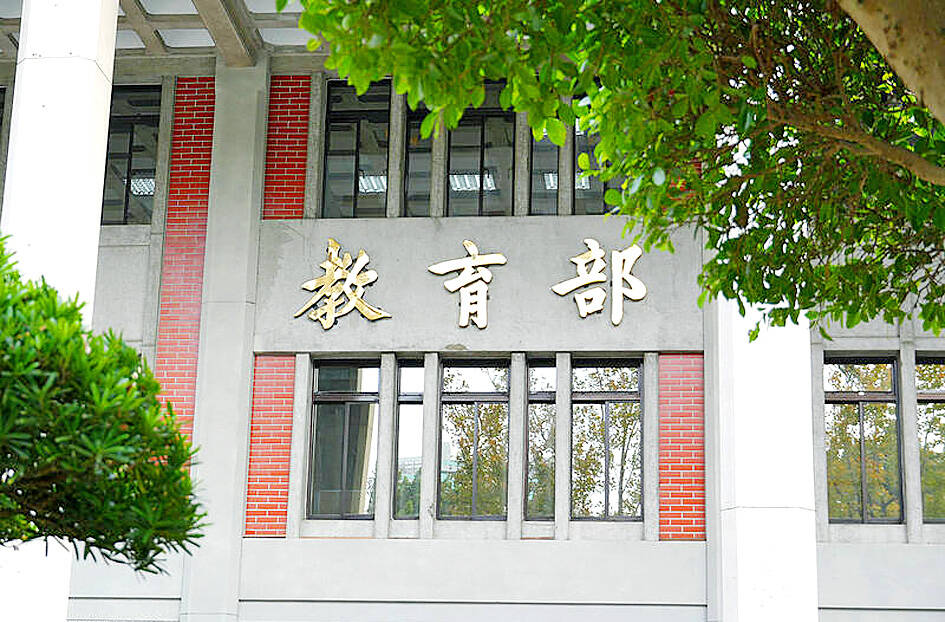Taiwan has sanctioned seven universities that are part of the Chinese Ministry of Industry and Information Technology as posing a national security risk, Minister of Education Cheng Ying-yao (鄭英耀) said yesterday.
Taiwanese universities and research institutions are forbidden from engaging in any academic activities or exchanges with seven Chinese universities to protect technology critical to national security interests, he said.
Students and researchers from the US have been banned from studying or working at the universities since 2020.

Photo: Rachel Lin, Taipei Times
Dubbed the “seven sons of [China’s] national defense,” the universities were founded by the Chinese Ministry of National Defense before they were transferred to the Chinese Ministry of Industry and Information Technology, Cheng said.
The “seven sons” are Beihang University, Beijing Institute of Technology, Northwestern Polytechnical University, Nanjing University of Aeronautics and Astronautics, Nanjing University of Science and Technology, Harbin Institute of Technology, and Harbin Engineering University.
The listed universities are heavily involved in developing Chinese arms, equipment, aviation, telecommunications, chemicals and material sciences, Cheng said, adding that they serve the aims of the Chinese People’s Liberation Army (PLA) and “united front” work.
The universities are technically excellent and remain certified as educational institutions, but continued cooperation with these schools poses too much of a risk to Taiwan’s national secrets and key technologies, Cheng said.
Taiwan does not recognize academic credentials issued by the PLA-run National University of Defense Technology, Naval Medical University and Air Force University, despite them being part of Project 985 and Project 211, Beijing’s programs to promote academic excellence.
“People sometimes make mistakes out of a scarcity of information — the Ministry of Education fights that by disclosing information via the Internet and career counseling in high schools,” Cheng said.
The ministry would take all appropriate measures to ensure that students and parents are fully informed before making a decision about their educational future, he added.
The US Department of Justice and US Department of Commerce sanctioned 18 universities including the “seven sons” in 2018 and 2020 to prevent technology theft.
The FBI has long asserted that Beijing directs academics and scientists to study and teach in the US to acquire sensitive technologies or information.
Japanese universities have also changed their protocols for exchanges and collaborations with China following reports that 45 Japanese institutions of higher learning risked the loss of key technologies by cooperating with the seven.
A Taiwanese researcher on condition of anonymity yesterday said that he had met many faculty members from the “seven sons” and had been approached by a Beijing Institute of Technology professor who hinted at illicit work.
Taiwanese researchers often worry about attending academic conferences with their Chinese counterparts out of fears that the latter could steal their research, he said.

A magnitude 5.6 earthquake struck off the coast of Yilan County at 12:37pm today, with clear shaking felt across much of northern Taiwan. There were no immediate reports of damage. The epicenter of the quake was 16.9km east-southeast of Yilan County Hall offshore at a depth of 66.8km, Central Weather Administration (CWA) data showed. The maximum intensity registered at a 4 in Yilan County’s Nanao Township (南澳) on Taiwan’s seven-tier scale. Other parts of Yilan, as well as certain areas of Hualien County, Taipei, New Taipei City, Taoyuan, Hsinchu County, Taichung and Miaoli County, recorded intensities of 3. Residents of Yilan County and Taipei received

Taiwan has secured another breakthrough in fruit exports, with jujubes, dragon fruit and lychees approved for shipment to the EU, the Ministry of Agriculture said yesterday. The Animal and Plant Health Inspection Agency on Thursday received formal notification of the approval from the EU, the ministry said, adding that the decision was expected to expand Taiwanese fruit producers’ access to high-end European markets. Taiwan exported 126 tonnes of lychees last year, valued at US$1.48 million, with Japan accounting for 102 tonnes. Other export destinations included New Zealand, Hong Kong, the US and Australia, ministry data showed. Jujube exports totaled 103 tonnes, valued at

TRUST: The KMT said it respected the US’ timing and considerations, and hoped it would continue to honor its commitments to helping Taiwan bolster its defenses and deterrence US President Donald Trump is delaying a multibillion-dollar arms sale to Taiwan to ensure his visit to Beijing is successful, a New York Times report said. The weapons sales package has stalled in the US Department of State, the report said, citing US officials it did not identify. The White House has told agencies not to push forward ahead of Trump’s meeting with Chinese President Xi Jinping (習近平), it said. The two last month held a phone call to discuss trade and geopolitical flashpoints ahead of the summit. Xi raised the Taiwan issue and urged the US to handle arms sales to

BIG SPENDERS: Foreign investors bought the most Taiwan equities since 2005, signaling confidence that an AI boom would continue to benefit chipmakers Taiwan Semiconductor Manufacturing Co’s (TSMC, 台積電) market capitalization swelled to US$2 trillion for the first time following a 4.25 percent rally in its American depositary receipts (ADR) overnight, putting the world’s biggest contract chipmaker sixth on the list of the world’s biggest companies by market capitalization, just behind Amazon.com Inc. The site CompaniesMarketcap.com ranked TSMC ahead of Saudi Aramco and Meta Platforms Inc. The Taiwanese company’s ADRs on Tuesday surged to US$385.75 on the New York Stock Exchange, as strong demand for artificial intelligence (AI) applications led to chip supply constraints and boost revenue growth to record-breaking levels. Each TSMC ADR represents